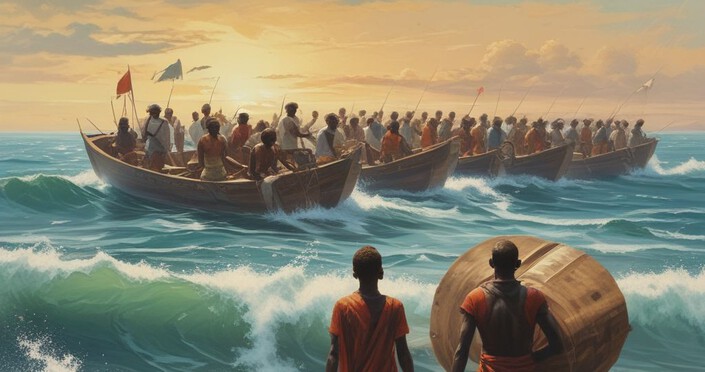Human Migration Cause and Effects

Causes of Human Migration
Human migration consists of both pros and cons to both the home and the host countries. Generally, migration has led to the transformation of cultural interaction throughout. There has been a transfer of goods, services and people from one part to another. International migration has been greatly contributed by the increased demand for labor. Writers who offer coursework help at Edudorm essay writing service notes that this has led to cultural diversity and has strengthened political ties among different countries. Urban centers attract more people from the rural regions due to available job opportunities. Human migration mostly comprises of the young people as they are the major portion of the workforce required. It is true to say that most immigrants move from developing countries to more developed ones.
Neoclassical Theory on the Major Causes of Human Migration
The neoclassical theory states that the major cause of human migration is as a result of labor and human migration due to the wage difference in geographical location. The wage difference is linked to the demand and supply of labor. Experts who do my coursework at Edudorm essay writing service indicates that in areas where there is a shortage of labor and the capital is in excess there are relative wages compared to an area with an excess supply of labor and have low capital (Adler, & Gielen, 2002). Labor flows from less-wage regions to more- wage regions which cause changes in labor flow in both countries (Collier, 2013). The theory is paramount about international human migration as it is not restricted by governmental regulation and the international immigrant’s law.
Dual labor market theory states that the main cause of human migration is due to the pull factors in most developing countries. It believes that the work markets of the urbanized countries comprise of tertiary section that require high trained labor and a prime segment that is labor demanding and requires less trained workers (Crawford, Campbell, & Campbell, 2012). Authors who offer custom coursework writing help at Edudorm essay writing service points that this shows why their human migration is from developing countries into more developed ones due to the pull created by the need of labor in their non-prime markets. The workforce required to seal the rung of the work market since the inhabitant laborers do not desire the jobs due to lack of mobility hence the need of migrant workers. As the availability of the jobs pushes up the wages, migration becomes even more attractive hence a hasty change (Collier, 2013).
Theory of New Economic of Work on Human Migration
The theory of new economic of work on human migration affirm that settlement patterns and flows cannot be entirely clarified by the intensity of individual workforce together with their economic enticements. Tutors who write my coursework at Edudorm essay writing service acknowledges that this is because there is also a wider social entity that should be considered by viewing the risk aversion on some household parts that has insufficient income (Adler, & Gielen, 2002). A household is in want of an additional capital which is attained throughout the transfer of funds so that it can be sent back to the family members who still anticipate migrating abroad. The discharge can have a wider outcome on the economy of the propelling country as they fetch in capital.
World system hypothesis views human migration from a universal viewpoint as it clarifies the contact among the unlike societies and how it is an important factor within the society due to the social change. There is an economic decline in trade as there are incentives to migrate to regions where the economy is more vibrant. Mentors who offer coursework writing service at Edudorm recognizes that free trade between countries can reduce human migration because the urbanized countries bring in labor-concentrated commodities which do cause a raise of untrained labor for the developing nations. This will reduce the outflow of the migrant workers to the developed countries (Adler, & Gielen, 2002).
Globalization as a cause of Human Migration
Globalization has been the major root cause of human migration. This is because people have different reasons as to why they migrate. This includes poverty, armed conflict, social strife, economic hardships and political turmoil. Advanced transport and communication technology has sphere headed globalization as it allows people to move as far as they can, travel within the shortest time possible as there are no significant obstacles since they can communicate freely and at any time (Goldin, Cameron & Balarajan, 2011). Instructors who offer coursework assistance at Edudorm essay writing service argues that due to globalization world economies have become more integrated due to the remittances made. Free trade agreements also cause human migration as most corporations benefits but devastates the local government and their economies that force people to migrate. War and government oppression causes people to move (Crawford, Campbell, & Campbell, 2012).
Impacts of Human migration
Human migration has some impacts on the home country due to specific challenges faced. In most cases, migrants move to another company in order to enhance them in making positive changes in their lives and future. This is because they seek better and sustainable wages due to the slow job markets and lack of education. They aim at improving their standard of living to a better and a desirable level. As a way of reducing immigrate the home country should analyze the statistics and address the reason why the citizens are moving out of the country in order to prevent the country from experiencing a decrease in population in the long run (Goldin, Cameron & Balarajan, 2011).
The host country experiences great advantages and some challenges as a result of human migration. The skilled gaps and job vacancies are filled which means that the economy can be sustained and can run more smoothly as labor is not strained. There are better services to the aging population because it is maintained. The pension gap is also filled as there are new contributions made by the young workers. The workers also pay taxes which improves government operation (Adler, & Gielen, 2002). As people in human migration aim to make their lives better there are usually determined hence bringing energy which leads to innovation. Teachers who offer English coursework help at Edudorm essay writing service says that as immigrants are from different geographical regions there are from different cultures. They come together and cohabitate with each other which leads to enriched cultural diversity. Falling schools are also transformed due to the increased demand for education. There are also some challenges experienced as migrants may be exploited, pressure on public services due the increase in immigrants and their maybe integration difficulties which may cause friction with the local people (Goldin, Cameron & Balarajan, 2011).
Conclusion
Human immigrants usually have different intentions of migrating as some may intend to settle temporarily while others permanently in the new location. Travel, tourism, and pilgrimages are not considered as tourism due to lack of settling intentions in the new location. There are a number of motives as to why individuals consider human migration to other countries. In the 21st century globalization has amplified the order for workforce in order to maintain nationwide economies. Most of the migrants are from developing countries as they are in search of sufficient income from the new jobs. The incomes obtained by the migrants are regularly driven back home to their relatives in a form of funds. This action has turn into a financial staple in a number of emergent economies.
Reference
Adler, L. L., & Gielen, U. P. (2002). Migration: Immigration and emigration in international perspective. Westport, Conn: Praeger.
Collier, P. (2013). Exodus: How migration is changing our world. Oxford; New York: Oxford University Press
Crawford, M. H., Campbell, B. C., & Campbell, B. C. (2012). Causes and consequences of human migration: An evolutionary perspective. Cambridge: Cambridge University Press
Goldin, I., Cameron, G., & Balarajan, M. (2011). Exceptional people: How migration shaped our world and will define our future. Princeton: Princeton University Press.


